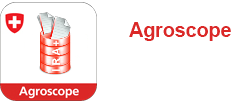The native mineral and trace elements supply from roughages in the basal diet of ruminants, requires full attention if a sustainable and economical supply of these nutrients is to be achieved. However, mineral and trace element concentrations in roughages need to be analysed regularly or can be retrieved from feed tables with reference values. In Switzerland, an annual survey of the quality of conserved roughages, including barn-dried and field-dried hay, as well as grass and whole-plant maize silage, has been carried out since 2012. A large proportion of all roughage samples collected on Swiss farms are analysed in two commercial laboratories for major organic nutrients and energy and protein value are estimated. At the explicit request of the farmers or extension services supplying the samples, concentrations of macro minerals (Ca, P, Mg, Na, K, S), trace minerals (Cu, Fe, Mn, Zn) and trace elements (Mo, Co, I, Se) are analysed by wet chemistry (ICP-AES/MS). All data are compiled annually in the Swiss Feed Database. Over the last 10 years the database has been expanded each year with 698±77 (mean ± standard deviation), 406±170, and 108±51 samples for macro minerals, trace minerals, and trace elements in hay, respectively; with 121±39, 84±38, and 10±8 samples analysed for macro minerals, trace minerals and trace elements in grass silage, respectively. The database on whole-plant maize silage was increased annually by 48±25, 23±16 and 6±3 samples for macro minerals, trace minerals, and trace elements, respectively. Samples are geolocated to regions and altitudes, and herbages are attributed to one of seven main grassland types as declared by farmers or advisors. The data collected from this nationwide survey deliver unique, annually updated information on mineral and trace element concentrations in a large number of roughages produced on Swiss farms. Based on these data, we present trends in mineral and trace element concentrations in roughages, compare them with existing reference values, and finally show the importance of the native mineral and trace element supply from roughages in typical roughage-based diets for ruminants.
Manzocchi E., Lautrou M., Schlegel P.
Swiss Feed Database: a closer look at minerals and trace elements in 10 years of roughage surveys.
Dans: 74th EAAP Annual Meeting. 31. August, Lyon (FR). 2023.
ID publication (Code web): 53938 Envoyer par e-mail
Precedenti progetti










